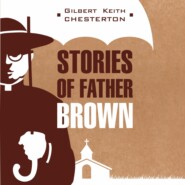По всем вопросам обращайтесь на: info@litportal.ru
(©) 2003-2024.
✖
The Man Who Knew Too Much
Настройки чтения
Размер шрифта
Высота строк
Поля
"I think," said his uncle, with restraint, "that we are sufficiently convinced of your interest in electricity."
Then after a pause he remarked, more amiably: "I suppose if I regretted any of my own impedimenta, it would be the pipe. Though, as a matter of fact, it's not much fun smoking in the dark. Everything seems different in the dark."
"Everything is different in the dark," said a third voice, that of the man who called himself a magician. It was a very musical voice, and rather in contrast with his sinister and swarthy visage, which was now invisible. "Perhaps you don't know how terrible a truth that is. All you see are pictures made by the sun, faces and furniture and flowers and trees. The things themselves may be quite strange to you. Something else may be standing now where you saw a table or a chair. The face of your friend may be quite different in the dark."
A short, indescribable noise broke the stillness. Twyford started for a second, and then said, sharply:
"Really, I don't think it's a suitable occasion for trying to frighten a child."
"Who's a child?" cried the indignant Summers, with a voice that had a crow, but also something of a crack in it. "And who's a funk, either? Not me."
"I will be silent, then," said the other voice out of the darkness.
"But silence also makes and unmakes."
The required silence remained unbroken for a long time until at last the clergyman said to Symon in a low voice:
"I suppose it's all right about air?"
"Oh, yes," replied the other aloud; "there's a fireplace and a chimney in the office just by the door."
A bound and the noise of a falling chair told them that the irrepressible rising generation had once more thrown itself across the room. They heard the ejaculation: "A chimney! Why, I'll be – " and the rest was lost in muffled, but exultant, cries.
The uncle called repeatedly and vainly, groped his way at last to the opening, and, peering up it, caught a glimpse of a disk of daylight, which seemed to suggest that the fugitive had vanished in safety. Making his way back to the group by the glass case, he fell over the fallen chair and took a moment to collect himself again. He had opened his mouth to speak to Symon, when he stopped, and suddenly found himself blinking in the full shock of the white light, and looking over the other man's shoulder, he saw that the door was standing open.
"So they've got at us at last," he observed to Symon.
The man in the black robe was leaning against the wall some yards away, with a smile carved on his face.
"Here comes Colonel Morris," went on Twyford, still speaking to Symon. "One of us will have to tell him how the light went out. Will you?"
But Symon still said nothing. He was standing as still as a statue, and looking steadily at the black velvet behind the glass screen. He was looking at the black velvet because there was nothing else to look at. St. Paul's Penny was gone.
Colonel Morris entered the room with two new visitors; presumably two new sightseers delayed by the accident. The foremost was a tall, fair, rather languid-looking man with a bald brow and a high-bridged nose; his companion was a younger man with light, curly hair and frank, and even innocent, eyes. Symon scarcely seemed to hear the newcomers; it seemed almost as if he had not realized that the return of the light revealed his brooding attitude. Then he started in a guilty fashion, and when he saw the elder of the two strangers, his pale face seemed to turn a shade paler.
"Why it's Horne Fisher!" and then after a pause he said in a low voice, "I'm in the devil of a hole, Fisher."
"There does seem a bit of a mystery to be cleared up," observed the gentleman so addressed.
"It will never be cleared up," said the pale Symon. "If anybody could clear it up, you could. But nobody could."
"I rather think I could," said another voice from outside the group, and they turned in surprise to realize that the man in the black robe had spoken again.
"You!" said the colonel, sharply. "And how do you propose to play the detective?"
"I do not propose to play the detective," answered the other, in a clear voice like a bell. "I propose to play the magician. One of the magicians you show up in India, Colonel."
No one spoke for a moment, and then Horne Fisher surprised everybody by saying, "Well, let's go upstairs, and this gentleman can have a try."
He stopped Symon, who had an automatic finger on the button, saying:
"No, leave all the lights on. It's a sort of safeguard."
"The thing can't be taken away now," said Symon, bitterly.
"It can be put back," replied Fisher.
Twyford had already run upstairs for news of his vanishing nephew, and he received news of him in a way that at once puzzled and reassured him. On the floor above lay one of those large paper darts which boys throw at each other when the schoolmaster is out of the room. It had evidently been thrown in at the window, and on being unfolded displayed a scrawl of bad handwriting which ran: "Dear Uncle; I am all right. Meet you at the hotel later on," and then the signature.
Insensibly comforted by this, the clergyman found his thoughts reverting voluntarily to his favorite relic, which came a good second in his sympathies to his favorite nephew, and before he knew where he was he found himself encircled by the group discussing its loss, and more or less carried away on the current of their excitement. But an undercurrent of query continued to run in his mind, as to what had really happened to the boy, and what was the boy's exact definition of being all right.
Meanwhile Horne Fisher had considerably puzzled everybody with his new tone and attitude. He had talked to the colonel about the military and mechanical arrangements, and displayed a remarkable knowledge both of the details of discipline and the technicalities of electricity. He had talked to the clergyman, and shown an equally surprising knowledge of the religious and historical interests involved in the relic. He had talked to the man who called himself a magician, and not only surprised but scandalized the company by an equally sympathetic familiarity with the most fantastic forms of Oriental occultism and psychic experiment. And in this last and least respectable line of inquiry he was evidently prepared to go farthest; he openly encouraged the magician, and was plainly prepared to follow the wildest ways of investigation in which that magus might lead him.
"How would you begin now?" he inquired, with an anxious politeness that reduced the colonel to a congestion of rage.
"It is all a question of a force; of establishing communications for a force," replied that adept, affably, ignoring some military mutterings about the police force. "It is what you in the West used to call animal magnetism, but it is much more than that. I had better not say how much more. As to setting about it, the usual method is to throw some susceptible person into a trance, which serves as a sort of bridge or cord of communication, by which the force beyond can give him, as it were, an electric shock, and awaken his higher senses. It opens the sleeping eye of the mind."
"I'm suspectible," said Fisher, either with simplicity or with a baffling irony. "Why not open my mind's eye for me? My friend Harold March here will tell you I sometimes see things, even in the dark."
"Nobody sees anything except in the dark," said the magician.
Heavy clouds of sunset were closing round the wooden hut, enormous clouds, of which only the corners could be seen in the little window, like purple horns and tails, almost as if some huge monsters were prowling round the place. But the purple was already deepening to dark gray; it would soon be night.
"Do not light the lamp," said the magus with quiet authority, arresting a movement in that direction. "I told you before that things happen only in the dark."
How such a topsy-turvy scene ever came to be tolerated in the colonel's office, of all places, was afterward a puzzle in the memory of many, including the colonel. They recalled it like a sort of nightmare, like something they could not control. Perhaps there was really a magnetism about the mesmerist; perhaps there was even more magnetism about the man mesmerized. Anyhow, the man was being mesmerized, for Horne Fisher had collapsed into a chair with his long limbs loose and sprawling and his eyes staring at vacancy; and the other man was mesmerizing him, making sweeping movements with his darkly draped arms as if with black wings. The colonel had passed the point of explosion, and he dimly realized that eccentric aristocrats are allowed their fling. He comforted himself with the knowledge that he had already sent for the police, who would break up any such masquerade, and with lighting a cigar, the red end of which, in the gathering darkness, glowed with protest.
"Yes, I see pockets," the man in the trance was saying. "I see many pockets, but they are all empty. No; I see one pocket that is not empty."
There was a faint stir in the stillness, and the magician said, "Can you see what is in the pocket?"
"Yes," answered the other; "there are two bright things. I think they are two bits of steel. One of the pieces of steel is bent or crooked."
"Have they been used in the removal of the relic from downstairs?"
"Yes."
There was another pause and the inquirer added, "Do you see anything of the relic itself?"
"I see something shining on the floor, like the shadow or the ghost of it. It is over there in the corner beyond the desk."
There was a movement of men turning and then a sudden stillness, as of their stiffening, for over in the corner on the wooden floor there was really a round spot of pale light. It was the only spot of light in the room. The cigar had gone out.
"It points the way," came the voice of the oracle. "The spirits are pointing the way to penitence, and urging the thief to restitution. I can see nothing more." His voice trailed off into a silence that lasted solidly for many minutes, like the long silence below when the theft had been committed. Then it was broken by the ring of metal on the floor, and the sound of something spinning and falling like a tossed halfpenny.
"Light the lamp!" cried Fisher in a loud and even jovial voice, leaping to his feet with far less languor than usual. "I must be going now, but I should like to see it before I go. Why, I came on purpose to see it."
The lamp was lit, and he did see it, for St. Paul's Penny was lying on the floor at his feet.

















